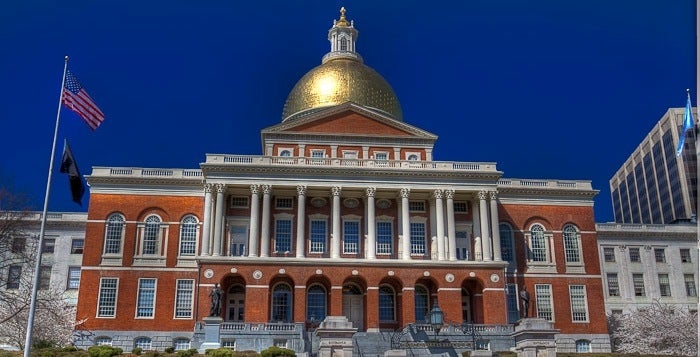A scaled-down version of Gov. Charlie Baker’s economic development bill cleared a key House-Senate committee on Wednesday and included a new provision that would allow families to claim a tax deduction on college savings.
The bill authorizes $593.9 million in capital investments over the next three years, a significant revision from the $918 million, five-year plan put forward by the governor in January. An administration official described the annual funding proposed in the new bill as “in line” with what Baker put forward, just over a shorter period of time.
Among the accounts that would receive a smaller guaranteed infusion of capital would be the MassWorks Infrastructure program, which Baker proposed to fund at $500 million over five years. Legislative leaders reduced it to $300 million over three years.
The Economic Development and Emerging Technologies Committee also lowered the amount set aside for a new workforce skills capital grants program to improve career technical education and job training from the $75 million proposed by Baker to $45 million.
“I strongly believe that the intersection of higher education and workforce development is one of the places where state government can be most helpful, and I am particularly pleased that we were able to include a number of those kinds of initiatives in this bill,” Sen. Eileen Donoghue, co-chair of the committee, said in a statement.
The committee added a section, which Baker has already voiced support for, that would allow individuals to take a $1,000 tax deduction on contributions into a college savings program, sometimes known as 529 plans. Married couples would be able to deduct $2,000 from their taxable income.
The Association of Independent Colleges and Universities said it was “thrilled” at the inclusion of the college savings tax incentive program in the committee bill. “Not only are college savings tax incentives the right thing to do for students and families, but the whole state benefits when students graduate with manageable student loans and are able to invest more of their post-college earnings back into the economy,” AICUM President Richard Doherty said.
The bill, which was released by committee with a favorable recommendation Wednesday afternoon, now moves to the House Bonding Committee, chaired by Rep. Antonio Cabral, for review.
Other additions made by the committee include a new angel investor tax credit for newly formed start-ups to be administered through the life sciences incentive program, $30 million for an advanced manufacturing trust fund, $4.5 million for a cybersecurity and data analytics center and the repeal of a Blue Law preventing the sale of alcohol on the day after Christmas when the holiday falls on a Sunday.
The bill also includes $71 million for national manufacturing innovation matching grants; $45 million for the brownfields redevelopment; $6 million for the Massachusetts Food Trust Program; an overhaul of Economic Development Incentive Program to allow eligibility for any project that will create full-time jobs; and incentives for communities to create new starter-home zoning districts.
“The Baker-Polito Administration’s economic development bill provides an important set of tools for achieving community development, workforce development, and advancing the Commonwealth’s nationally-leading innovation economy. The joint committee’s action is an important step toward realizing that vision and we look forward to continuing to engage with our partners in the Legislature to get a bill to the Governor’s desk this session,” said Paul McMorrow, spokesman for Economic Development Secretary Jay Ash.
The bill does not appear to include any of the liquor law reforms proposed by Baker, including changes to allow retailers who sell alcohol to also serve alcohol in in-house restaurants and to allow local farmer-brewers and farmer-distillers to sell their products at farmers markets.
The committee also opted against putting a sales tax holiday for August into the bill, which is sometimes debated in the context of economic development but could face added opposition this year in light of slow growth in state tax revenues.

